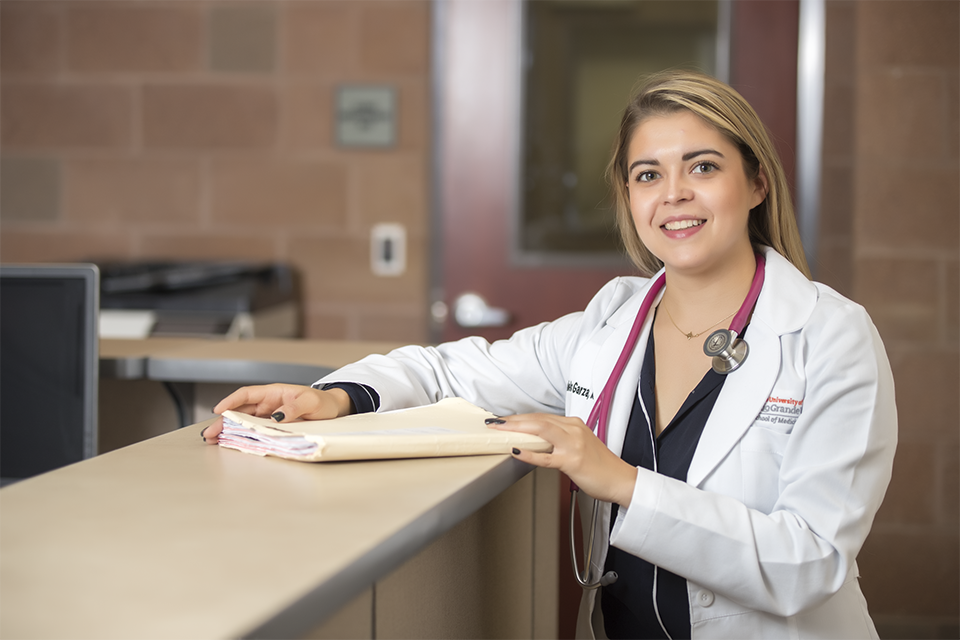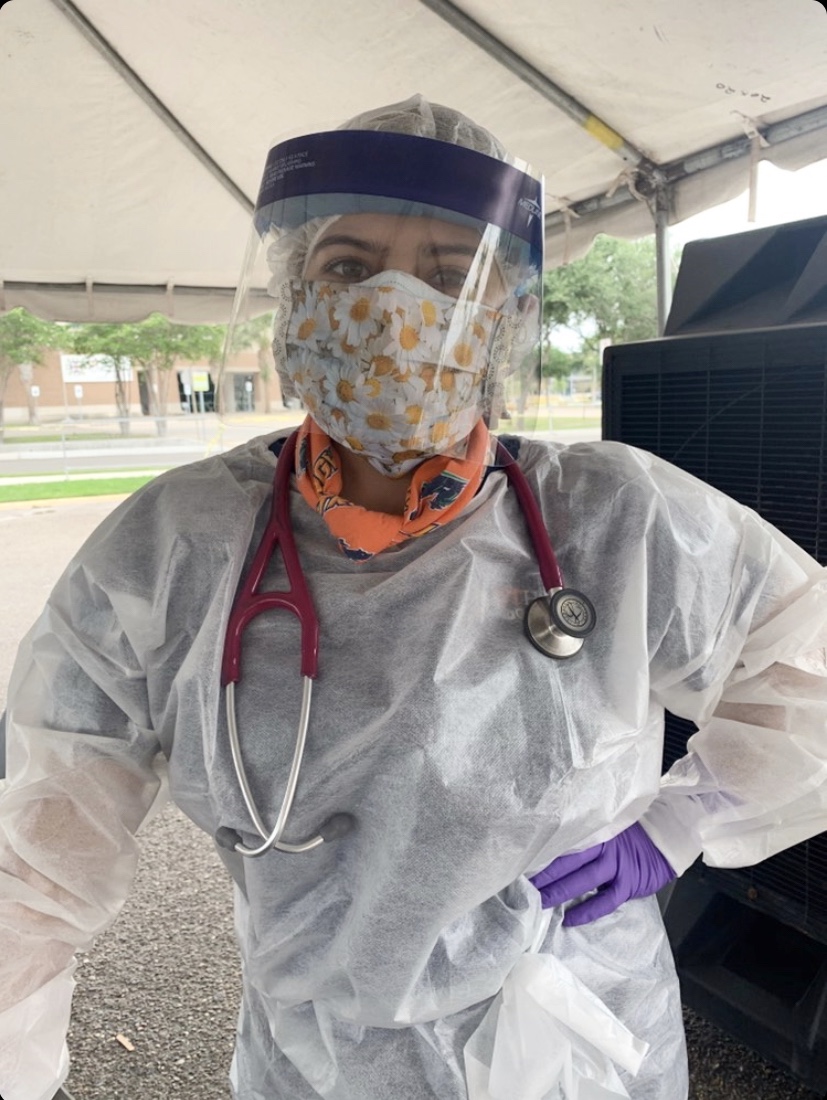By News and Internal Communications
By Dimitra Trejo
RIO GRANDE VALLEY, TEXAS – JULY 23, 2020 – Daniela Garza is a powerhouse. At the age of 30 she is already a practicing physician assistant with UT Health RGV and has just completed her doctoral degree in medical science as well.
She is also placing herself on the front lines of the COVID-19 pandemic, swathed in personal protective gear to simultaneously block exposure to herself and prevent transmission to others.
A graduate of the UTRGV College of Health Professions’ Physician Assistant program, Garza since March 2020 has been working with UT Health RGV and the School of Medicine at the university’s four drive-thru COVID-19 testing sites, one each in Edinburg, Mercedes, Harlingen and Brownsville.
She and an army of UT Health RGV providers and staff have the daunting task of screening thousands of patients each day using COVID-19 nose swabbing tests. To date, UT Health RGV screening sites have taken about 15,000 swab tests.
A native of Elsa, Texas, Garza is the first in her family to study medicine.
“I’m a first-generation college student on my dad's side, and second-generation on my mom's side,” she said. “I grew up from humble beginnings and my parents are really hard workers.
They worked their way up to become teachers. Because of them, I'm the first in my family to go into medicine. And now I have the highest degree in my family with a doctorate.”
While she worked on her medical career, she also was helping her family, including a sibling who is autistic. Her work ethic, along with the need to help others, has shaped the trajectory of her career, she said.
It also helped prepare her, in many ways, for the battle against COVID-19.
“I found a perfect avenue through the university and the medical school to do what I love and help others,” she said. “I was given the opportunity to work with UT Health RGV’s UniMóvil and have been able to work with the most vulnerable patients.”
UniMóvil is a mobile clinic created to bring primary care to people in underserved communities who struggle with access to healthcare. Now, the UniMóvil clinic has stopped running to accommodate COVID-19 needs and UniMóvil staff make up the core team for the drive-thru screening sites.
ADAPTING
Garza readily admits she was worried and uncertain when she found out her services would be needed at the COVID-19 testing sites, rather than with UniMóvil, but she pushed forward.
As the lead provider for the UT Health RGV testing site in Edinburg, she sees and assesses patients, helps manage the medical staff, and advises new providers who come to help.
“Just because we're in the medical field doesn't mean that we're ‘in the know’ more than people who are just watching the news on TV,” she said. “In medicine, you never know who’s going to walk through the door when you see a new patient, which is normal. But with COVID-19, every single patient is new. They are all fearful of this virus. And we are all learning on the fly.”
Garza, who has asthma, said she has had to learn how to care for herself under an all new set of challenges.
“I’ve had to learn how to care for my staff, too. I’ve asked myself, ‘How do we limit exposure to ourselves, to our family, to our partners?’ There were so many questions.”
She is happy she can help her community by administering COVID-19 tests, but admits every day is a new battle.
“We have learned to adapt to so many issues,” Garza said. “The first issue was the PPE – the N95 mask is no joke. Many of us have had a lot of pain on our nose from the pressure to our face because of how restricting it is. But that issue came and went because we just got used to it.”
“Next, the Texas heat. A couple of us have been dehydrated more times than we’d like to admit. I had heat exhaustion on the line but kept working because there was such a severe need to test within our community.”
Mosquitoes and other bugs have been an issue, she said. And unexpected weather, like pouring rain.
“I mean, we’re under a huge metal structure, along with our equipment. It’s been a learning experience, for sure, troubleshooting these issues on top of potentially being contaminated with the virus.”
Despite the many challenges, this is where Garza, and other UTRGV frontline workers, choose to be. They all try to stay positive, to help each other through it.
“It’s so surreal. We're taking part in the largest pandemic since the 1918 Spanish Flu, in full PPE, serving the people I love,” Garza said. “I think it's the same mentality as people who sign up to be in the military. They don't expect right away to go to war. It just happens and they get called to go. It's the same thing with medical professionals – you never know what’s going to come along.”
SUPPORT AND GUIDANCE
Garza said navigating the COVID-19 pandemic would not have been possible without Dr. Linda Nelson, senior director of Clinical Operations for the UTRGV School of Medicine and UT Health RGV. (Read about Nelson’s role in the Front Line fight against COVID-19.)
“Nelson’s constant encouragement and faith in me has been really wonderful and very much appreciated,” Garza said. “She’s the main one who’s been out here with us every day, since day one, and even on weekends she’s on the front lines doing it all. She is the driving force.”
She said Nelson has motivated her in many ways.
“She's a mid-level provider by training, but she went back for more schooling and got her doctorate and has worked her way up,” she said. “Seeing this is what motivated me to finish up my doctorate.”
Garza said she actually was conferred right in the middle of her work shift at one of the UT Health RGV drive-thru testing sites.
“I got my degree while testing people for COVID-19, in full PPE,” Garza said. “I was working that day and it was so surreal. It meant a lot to me, but it meant so much more to my family. My grandparents didn't know how to read or write. To come from that, to me graduating – it means a lot.”
Garza said she plans to continue providing for the people of the Rio Grande Valley as long as she is needed. It is what motivates her to get up every day and continue the fight against COVID-19, she said.
“I stayed here because I wanted everyone to see what the Valley could create and what the Valley could produce,” she said. “I like to think we’re the heroes without the capes. We may be huffing and puffing about the heat, but we will always serve every single patient who comes to us. I will do this job for as long as they need me to be out here testing the people of my community.”
ABOUT UTRGV
The University of Texas Rio Grande Valley (UTRGV) was created by the Texas Legislature in 2013 as the first major public university of the 21st century in Texas. This transformative initiative provided the opportunity to expand educational opportunities in the Rio Grande Valley, including a new School of Medicine and a School of Podiatry, and made it possible for residents of the region to benefit from the Permanent University Fund – a public endowment contributing support to the University of Texas System and other institutions.
UTRGV has campuses and off-campus research and teaching sites throughout the Rio Grande Valley including Brownsville (formerly The University of Texas at Brownsville campus), Edinburg (formerly The University of Texas-Pan American campus), Harlingen, Weslaco, McAllen, Port Isabel, Rio Grande City and South Padre Island. UTRGV, a comprehensive academic institution, enrolled its first class in the fall of 2015; the School of Medicine welcomed its first class in the summer of 2016, and the School of Podiatric Medicine in the fall of 2022.


